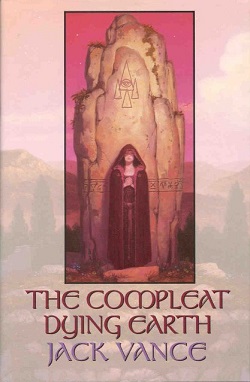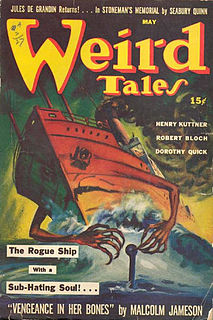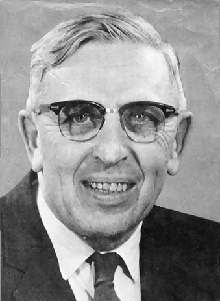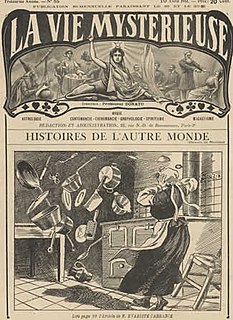
Dying Earth is a fantasy series by the American author Jack Vance, comprising four books originally published from 1950 to 1984. Some have been called picaresque. They vary from short story collection to fix-up perhaps all the way to novel.

John Holbrook "Jack" Vance was an American mystery, fantasy, and science fiction writer. Though most of his work has been published under the name Jack Vance, he also wrote 9 mystery novels using his full name John Holbrook Vance, three under the pseudonym Ellery Queen, and one each using the pseudonyms Alan Wade, Peter Held, John van See, and Jay Kavanse. Some editions of his published works give his year of birth as 1920.
The Man Who Sold the Moon is the title of a 1950 collection of science fiction short stories by American writer Robert A. Heinlein.

Algirdas Jonas "Algis" Budrys was a Lithuanian-American science fiction author, editor, and critic. He was also known under the pen names Frank Mason, Alger Rome, John A. Sentry, William Scarff, and Paul Janvier.

John Stewart Williamson, who wrote as Jack Williamson, was an American science fiction writer, often called the "Dean of Science Fiction" after the death of Robert Heinlein in 1988. Early in his career he sometimes used the pseudonyms Will Stewart and Nils O. Sonderlund.

Michael Shea was an American fantasy, horror, and science fiction author. His novel Nifft the Lean won the World Fantasy Award, as did his novella Growlimb.

Project Nightmare is a science fiction short story by Robert A. Heinlein, first published in Amazing Stories, May 1953, and reprinted in various collections, including The Menace from Earth.

Raymond Fisher Jones was an American science fiction author. He is best known for his 1952 novel This Island Earth, which was adapted into the eponymous 1955 film.

Malcolm Routh Jameson, commonly known as Malcolm Jameson, was an American science fiction author. An officer in the US Navy, he was active in American pulp magazines during the Golden Age of Science Fiction. His writing career began when complications of throat cancer limited his activity. According to John W. Campbell Jr., Jameson "had much to do with the development of modern [c.1945] naval ordnance."

The Mixed Men is a fix-up novel of science fiction short stories by Canadian-American writer A. E. van Vogt that focus on the mixed offspring of Dellian Supermen and human beings. The novel's title is taken from van Vogt's 1945 Astounding SF short story "Mixed Men", which was nominated for a Retro Hugo Award in 1996. The stories published in the novel were originally released between the years of 1943 to 1945 in Astounding SF, with the novel being first published in a 5,000 copy printing in 1952 by Gnome Press and a 1955 Berkley Books edition under the title Mission to the Stars.

Robots Have No Tails is a 1952 collection of science fiction short stories by Lewis Padgett. It was first published by Gnome Press in 1952 in an edition of 4,000 copies. The stories all originally appeared in the magazine Astounding Stories.

The Five Gold Bands is a science fiction novel by American writer Jack Vance, first published in the November 1950 issue of Startling Stories magazine. It was published in 1953 as a separate book under the title The Space Pirate, and in 1963 it was paired with Vance's Hugo Award-winning novella The Dragon Masters in the form of an Ace Double.

The Star-Crowned Kings is a science fiction novel written in 1975 by Rob Chilson. This was the 2nd full novel written by Robert Chilson.

Songs of the Dying Earth: Stories in Honor of Jack Vance is a collection of short fiction and shorter essays composed in appreciation of the science fiction and fantasy author Jack Vance, especially his Dying Earth series. Edited by George R. R. Martin and Gardner Dozois, it was published in 2009 by Subterranean Press.

"Ullward's Retreat" is a science fiction novelette written by Jack Vance and first published in the December 1958 issue of Galaxy magazine. In the preface to the story in the anthology The Best of Jack Vance, the author stated that this was one of his favorite stories.

Clifford Donald Simak was an American science fiction writer. He won three Hugo Awards and one Nebula Award. The Science Fiction Writers of America made him its third SFWA Grand Master, and the Horror Writers Association made him one of three inaugural winners of the Bram Stoker Award for Lifetime Achievement.

Double Jeopardy is a science fiction novel by Fletcher Pratt. It was first published in hardcover by Doubleday in 1952, and reprinted as a selection of the Science Fiction Book Club in 1953. The first paperback edition was issued in digest form by Galaxy Publishing Corporation as its Galaxy Science Fiction Novel #30 in 1957; a second paperback edition was issued by Curtis Books in 1967. The novel has been translated into Italian. The book is a combination of two shorter pieces, the novellas "Double Jeopardy" and "The Square Cube Law," originally published in the magazine Thrilling Wonder Stories in the issues for April, 1952 and June, 1952, respectively.

Eight Fantasms and Magics is a collection of science fiction and fantasy stories by Jack Vance. It was originally published by Macmillan in 1969 and reprinted in paperback by Collier Books in 1970. No further editions have been issued.

Space Mail is an anthology of science fiction short works edited by Isaac Asimov, Martin H. Greenberg, and Joseph Olander. It contains a series of short stories written in the form of letters, diary entries, or memoranda. The book is broken into three sections, each of which contains stories written in the type of documentation after which the section is named.




















